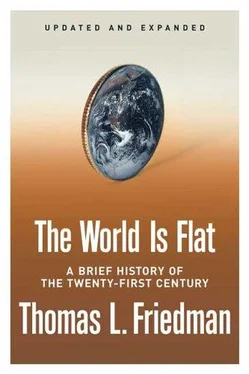“The Monitor Is Burning?”
Do you know what an Indian call center sounds like? While filming the documentary about outsourcing, the TV crew and I spent an evening at the Indian-owned “24/7 Customer” call center in Bangalore. The call center is a cross between a co-ed college frat house and a phone bank raising money for the local public TV station. There are several floors with rooms full of twenty-somethings— some twenty-five hundred in all-working the phones. Some are known as “outbound” operators, selling everything from credit cards to phone minutes. Others deal with “inbound” calls-everything from tracing lost luggage for U.S. and European airline passengers to solving computer problems for confused American consumers. The calls are transferred here by satellite and undersea fiber-optic cable. Each vast floor of a call center consists of clusters of cubicles. The young people work in little teams under the banner of the company whose phone support they are providing. So one corner might be the Dell group, another might be flying the flag of Microsoft. Their working conditions look like those at your average insurance company. Although I am sure that there are call centers that are operated like sweatshops, 24/7 is not one of them.
Most of the young people I interviewed give all or part of their salary to their parents. In fact, many of them have starting salaries that are higher than their parents' retiring salaries. For entry-level jobs into the global economy, these are about as good as it gets.
I was wandering around the Microsoft section around six p.m. Bangalore time, when most of these young people start their workday to coincide with the dawn in America, when I asked a young Indian computer expert there a simple question: What was the record on the floor for the longest phone call to help some American who got lost in the maze of his or her own software?
Without missing a beat he answered, “Eleven hours.”
“Eleven hours?” I exclaimed.
“Eleven hours,” he said.
I have no way of checking whether this is true, but you do hear snippets of some oddly familiar conversations as you walk the floor at 24/7 and just listen over the shoulders of different call center operators doing their things. Here is a small sample of what we heard that night while filming for Discovery Times. It should be read, if you can imagine this, in the voice of someone with an Indian accent trying to imitate an American or a Brit. Also imagine that no matter how rude, unhappy, irritated, or ornery the voices are on the other end of the line, these young Indians are incessantly and unfailingly polite.
Woman call center operator: “Good afternoon, may I speak with...?” (Someone on the other end just slammed down the phone.)
Male call center operator: “Merchant services, this is Jerry, may I help you?” (The Indian call center operators adopt Western names of their own choosing. The idea, of course, is to make their American or European customers feel more comfortable. Most of the young Indians I talked to about this were not offended but took it as an opportunity to have some fun. While a few just opt for Susan or Bob, some really get creative.)
Woman operator in Bangalore speaking to an American: “My name is Ivy Timberwoods and I am calling you...”
Woman operator in Bangalore getting an American's identity number: “May I have the last four digits of your Social Security?”
Woman operator in Bangalore giving directions as though she were in Manhattan and looking out her window: “Yes, we have a branch on Seventy-fourth and Second Avenue, a branch at Fifty-fourth and Lexington...”
Male operator in Bangalore selling a credit card he could never afford himself: “This card comes to you with one of the lowest APR...”
Woman operator in Bangalore explaining to an American how she screwed up her checking account: “Check number six-six-five for eighty-one dollars and fifty-five cents. You will still be hit by the thirty-dollar charge. Am I clear?”
Woman operator in Bangalore after walking an American through a computer glitch: “Not a problem, Mr. Jassup. Thank you for your time. Take care. Bye-bye.”
Woman operator in Bangalore after someone has just slammed down the phone on her: “Hello? Hello?”
Woman operator in Bangalore apologizing for calling someone in America too early: “This is just a courtesy call, I'll call back later in the evening...”
Male operator in Bangalore trying desperately to sell an airline credit card to someone in America who doesn't seem to want one: “Is that because you have too many credit cards, or you don't like flying, Mrs. Bell?”
Woman operator in Bangalore trying to talk an American out of her computer crash: “Start switching between memory okay and memory test...”
Male operator in Bangalore doing the same thing: “All right, then, let's just punch in three and press Enter...”
Woman operator in Bangalore trying to help an American who cannot stand being on the help line another second: “Yes, ma'am, I do understand that you are in a hurry right now. I am just trying to help you out...”
Woman operator in Bangalore getting another phone slammed down on her: “Yes, well, so what time would be goo...”
Same woman operator in Bangalore getting another phone slammed down on her: “Why, Mrs. Kent, it's not a...”
Same woman operator in Bangalore getting another phone slammed down on her: “As a safety back... Hello?”
Same woman operator in Bangalore looking up from her phone: “I definitely have a bad day!”
Woman operator in Bangalore trying to help an American woman with a computer problem that she has never heard before: “What is the problem with this machine, ma'am? The monitor is burning?”
There are currently about 245,000 Indians answering phones from all over the world or dialing out to solicit people for credit cards or cell phone bargains or overdue bills. These call center jobs are low-wage, low-prestige jobs in America, but when shifted to India they become high-wage, high-prestige jobs. The esprit de corps at 24/7 and other call centers I visited seemed quite high, and the young people were all eager to share some of the bizarre phone conversations they've had with Americans who dialed 1-800-HELP, thinking they would wind up talking to someone around the block, not around the world.
C. M. Meghna, a 24/7 call center female operator, told me, “I've had lots of customers who call in [with questions] not even connected to the product that we're dealing with. They would call in because they had lost their wallet or just to talk to somebody. I'm like, 'Okay, all right, maybe you should look under the bed [for your wallet] or where do you normally keep it,' and she's like, 'Okay, thank you so much for helping.'” Nitu Somaiah: “One of the customers asked me to marry him.” Sophie Sunder worked for Delta's lost-baggage department: “I remember this lady called from Texas,” she said, “and she was, like, weeping on the phone. She had traveled two connecting flights and she lost her bag and in the bag was her daughter's wedding gown and wedding ring and I felt so sad for her and there was nothing I could do. I had no information.
“Most of the customers were irate,” said Sunder. “The first thing they say is, 'Where's my bag? I want my bag now!' We were like supposed to say, 'Excuse me, can I have your first name and last name?' 'But where's my bag!' Some would ask which country am I from? We are supposed to tell the truth, [so] we tell them India. Some thought it was Indiana, not India! Some did not know where India is. I said it is the country next to Pakistan.”
Although the great majority of the calls are rather routine and dull, competition for these jobs is fierce-not only because they pay well, but because you can work at night and go to school during part of the day, so they are stepping-stones toward a higher standard of living. P. V. Kannan, CEO and cofounder of 24/7, explained to me how it all worked: “Today we have over four thousand associates spread out in Bangalore, Hyderabad, and Chennai. Our associates start out with a take-home pay of roughly $200 a month, which grows to $300 to $400 per month in six months. We also provide transportation, lunch, and dinner at no extra cost. We provide life insurance, medical insurance for the entire family— and other benefits.”
Читать дальше












